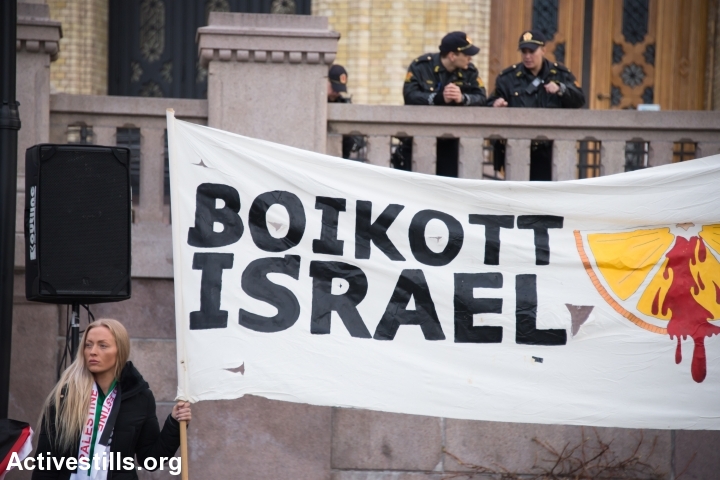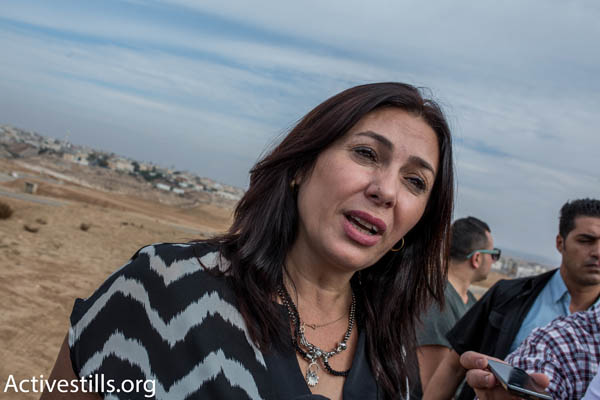Israeli members of Knesset, along with journalists, commentators and others are taking advantage of the boycott movement in order to delegitimize Israeli human rights groups at home.

As all eyes in Israel obsessively turned their attention to BDS, a subplot emerged that has gone by the wayside — one that I believe is the real story regarding the boycott movement’s current role within Israeli society.
Last week Israel’s Foreign Ministry called on Switzerland to pull its funding from an event put on by Israeli NGO Breaking the Silence, in an effort to force the organization to cancel its upcoming exhibit featuring soldiers’ testimonies of IDF human rights violations, which is supposed to open in Zurich this month. In response to the exhibit, newly-appointed Deputy Foreign Minister Tzipi Hotovely (Likud) said: “The Foreign Ministry will continue its extensive actions against organizations that are acting against Israel, at home and abroad.” Gilad Erdan, the new minister for strategic affairs who has been tasked with combatting the Israel boycott, has called Breaking the Silence an organization that “leads the delegitimization campaign against Israeli soldiers.”
Also last week, in one of her first acts as new minister of culture and sport, Miri Regev pulled the ministry’s sponsorship from a solo dance show that incorporates footage taken by B’Tselem volunteers in the West Bank. Entitled “Archive,” Israeli artist and choreographer Arkadi Zaides mimics the physical expressions and movements of Israeli settlers and soldiers, projected onto a large screen behind him. The show highlights their violent and domineering body language, as seen from the perspective of Palestinians behind the camera. The show, which first launched in Europe and has already taken the stage in Israel, no longer bears the Culture Ministry logo. Now Regev is considering pulling its funding.
While the two incidents may seem minor and insignificant, they are a sharp indication of this government’s crackdown on dissent and independent art.
It is, after all, no coincidence that this all happened on the same week as the eruption of the BDS debate here in Israel. This is the product of a concerted effort by the Right, which includes mainstream journalists and commentators, to conflate any boycott efforts — whether by FIFA, Orange, student unions or settlement product-labeling Europeans — with the work of Israeli human rights groups such as B’Tselem and Breaking the Silence (two organizations that have absolutely nothing to do with boycott of any kind).
The real victims of BDS
On Twitter, several Israeli journalists claimed that Breaking the Silence defames soldiers and spread lies about the IDF — and in doing so pour fuel on the BDS fire — and thus are one in the same. In a column on why BDS threatens Israel’s very existence, Yedioth Ahronoth columnist Ben-Dror Yemini wrote that “When a member of Breaking the Silence appears at events sponsored by BDS, that is not criticism. That is demonization. When Peter Beinart, one of the leaders of the Jewish left in the United States, who defines himself as a Zionist and Orthodox, claimed that on Lag BaOmer of 2014 Jews committed a pogrom against Palestinians, he was not working to criticize. He spread a blood libel.”
The lumping together of the various calls to boycott Israel with Israeli groups that criticize the country’s policies is yet another tactic used to shut down internal dissent. As Tomer Persico recently wrote on the site, the effect of rising international pressure in Israel leads to a situation in which “nationalism grows, internal dissent is silenced, and various democratic characteristics become weaker, or are weakened.”
While certain elements among BDS supporters do challenge Israel’s right to exist as the exclusive nation-state of the Jewish people, there are also Jewish Israelis who happen to agree — whether because they do not believe Israel can be both Jewish and democratic, or simply because they don’t want to live in a Jewish state.
Should they be barred from expressing their alternative view, no matter how unpopular it is? Does it make them, as Netanyahu has deemed, anti-Semitic? Does it mean they condone ISIS? Of course not. But the tactic of stifling dissent works, especially because Israelis are astonishingly ignorant of the actual BDS mission statement, not to mention the various approaches of boycott. As such, Israeli members of Knesset, journalists, commentators and others are able to use BDS to delegitimize Israeli human rights groups at home who have nothing to do with the movement.
While Orange is not pulling its business out of Israel anytime soon, the real victim of BDS — or more accurately, of Israel’s portrayal and manipulation of BDS — is dissent here at home.



